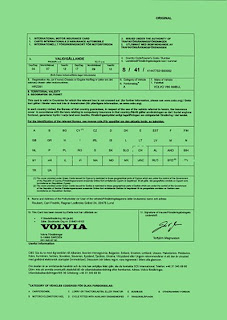After visiting the Stalin museum, we drove southwards to Tbilisi, capital and biggest city of Georgia. A colleague of me and Rico from the Google Zürich office, Ihar Mahaniok, a positively over-social engineer originally from Belarus, had been excited to hear about our travel plans and asked me whether I actually knew any people in Central Asia. I had answered that one reason for doing this journey was that I didn’t actually know anyone east of Istanbul and west of Beijing. Upon hearing this, Ihar had then promptly offered to lend us some of his friends along our route, and sent an introduction mail to them explaining who we were and why we were coming to visit them. So when we finally arrived in Tbilisi in the early evening, there was a welcoming committee there to meet us.
Head of the welcoming committee was Nino Nanitashvili, who had learned to know Ihar through being co-organizer of the Google Developers’ Group, GDG Tbilisi. The first hearty laugh of the evening came as soon as we met, and promptly were forced to realize that Nino was a girl. The combined facts that Nino is a guys’ name in Europe and that a crushing majority of all Google Developers’ Groups members are guys had lead us to never even consider the possibility that the person we were about to meet could be a girl. (We soon came to learn that Nino actually is one of the most popular girls’ names in Georgia.) With that confusion cleared up, she then introduced us to the friends she had brought along: Elene, Mirian and Zura.
The first thing we needed our new friends to help us with was to find a suitable place to stay for an unknown number of nights, and it turned out that Elene had a friend who worked at the Soul House Hostel so she called them up and asked if they had room for us. Then we packed all of us into the ambulance (which, by a stroke of bureaucratic confusion, has been legally registered to take 5+1 passengers; and as tightly packed as the passengers in the patient-care compartment were, actual road-safety was covered as well) and we went out on a Brownian motion drive through a city that is in the midst of great economic transformation with heavy traffic, roadworks, detours, construction sites, and general chaos everywhere. Elene started out as the co-driver, but was soon replaced by Zura, who lasted a wee bit longer before he in turn got replaced by Mirian, who with the combined help of a smartphone map and Elene and Zura shouting from the back finally managed to direct us to the correct location. During this fray, I accidentally broke more traffic rules than I would prefer to remember and in cold blood I took a highly illegal left turn that earned the respect of Zura: “Man, than maneuver was really bad-ass!”
(Three days later, when I had learned to find my way through central Tbilisi, I could come to the conclusion that for someone intimately familiar with all the roadworks and detours, that entire drive would only have needed to be around four blocks.)
The hostel was a most charming place: An old and worn but beautifully decorated two-story house crammed in between larger houses in a small alley, surrounded by wine and laundry. The house itself had a melodramatic history; it is owned by a family who’s eldest son was a talented painter, who’s paintings adorns most rooms, but who had a tragic soul and ended his own life. After this tragedy, the family could no longer bear to live in the house and moved out, now instead renting the house to Vita, who today runs the hostel there with the off-and-on help of Nanuka, Macaco and Kate (plus Elene’s friend, who happened to be not actually there during our stay).
Being thus well put up for the night, and for the nights to come, the welcoming committee took us out for dinner, to eat our way through Georgian cuisine and culture. The quality of produce in this country is simply amazing and even the simplest tomato-&-onion salads are a treat, and the full breadth of the cuisine offers a wealth of kebabs, pies, dumplings, breads, cheeses and other delicacies from its long tradition. Upon hearing that I had a guilty pleasure for semi-sweet red wine, Zura swiftly ordered a bottle of excellent Khvanchkara (the kind of wine from western Georgia that was Stalin’s personal favourite). Thus it was long past midnight before we realized that it was getting late and that we were getting tired, and all of us had to get up early the next morning.
Then we spent the days getting visas for entering Azerbaijan, visiting the Swedish Ambassador, sightseeing (the old town, the Holy Trinity Cathedral, etc.), doing laundry, communicating with the people back home, eating more good food, and so on.
Being co-organizer of the Google Developers’ Group, Nino obviously couldn’t resist the opportunity of having two engineers from the largest Google engineering office outside of the US visiting, so on Wednesday night she got me and Rico to give a lecture at the Caucasus University to the local developers’ group on the topic of what we do at Google, together with a Q&A session. This turned out to be a highly appreciated event, as can be seen in the group photo taken afterwards:
In the audience, among the assorted hackers and computer geeks, was also Mr. Irakli Kashibadze, Head of the Communications, IT and Innovations Department of the Ministry of Economy and Sustainable Development of Georgia, who invited us and a selection of the attendees to dinner afterwards. More great Georgian food, locally-brewed beer, and once again a long and joyful night.
Rico and I have already started sketching on a plan to return to Tbilisi after winter, to meet everybody again and run a workshop with the GDG.















